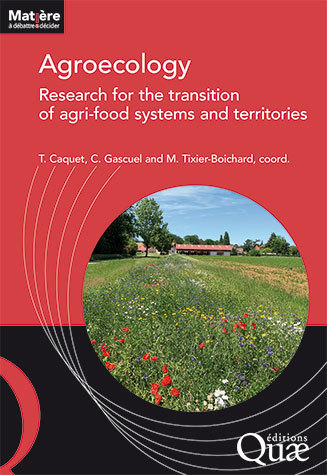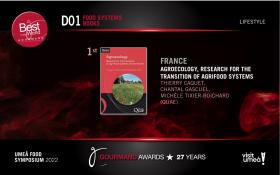Agroecology Reading time 4 min
Agroecology: Research for the transition of agri-food systems and territories
Published on 15 January 2020 (date.last_update 04 January 2021)


Agroecology, as a scientific discipline that puts ecology back at the centre of agricultural system design, is now well established. This book reviews the research avenues which need to be developed so that agroecology can contribute to developing sustainable agriculture.
Diversification of living organisms in agroecosystems is a broad objective that is intended to make these systems more robust and resilient. Research in genetics and landscape ecology must be mobilized so that agroecology can use mechanisms from the field to landscape scales. Progress is being made in modelling agroecological systems to better understand the many biotic and abiotic interactions, to predict them, and to begin to manage some of them. Diversification of living organisms in agricultural production (species, varieties, crop rotations, etc.) leads to more varied products. The consequences will be significant on the commodity chains, and more precisely on agri-food systems, from production methods to product consumption. These changes are long-term. The agroecological transition, which is adaptive, co-constructed with all actors, is in itself a research subject, and will rely on experimental devices, farms, and ‘Territories of innovation’.
Editorial coordination
Thierry Caquet, INRAE Scientific Director of Environment.
Chantal Gascuel, hydrologist at the INRAE research centre in Rennes, studies the relations between agriculture, landscape and water quality. She is responsible for soil and water research issues at the INRAE Scientific Directorate for Environment
Michèle Tixier-Boichard, INRAE, researcher at the Joint Research Unit for Animal Genetics and Integrative Biology (GABI), Jouy-en-Josas
Editions Quae – collection Matières à débattre & décider – 106 pages, December 2020 – 25 euros. You can download the file free of charge.
Extracts from the Foreward
"Over the past decade, many national and international entities have become enthusiastic proponents of agroecology. In 2012, the French Ministry of Agriculture launched the “Agroecological project for France”. This mobilizing project for all of French agriculture is aimed to produce differently by rethinking agricultural production systems and by making them part of collective dynamics, especially through Economic and Environmental Interest Groups, i.e. groups of farmers sharing the same agroecological perspectives (GIEE). The French Economic, Social and Environmental Council (CESE) took up the issue of agro-ecology and weighed in with an opinion in 2016. The Food and Agriculture Organization of the United Nations (FAO) organized the first “International Symposium on Agroecology for Food Security and Nutrition” in 2014. It subsequently organized meetings by world region and shared conclusions of these meetings at a second symposium in April 2018, where it launched the “Scaling up Agroecology Initiative”. At the same time, the French Agricultural Research Centre for International Development (CIRAD) and the French National Research Institute for Agriculture, Food and Environment (INRAE) highlighted their convergence of views on agroecology in a joint note. All of this activity not only stimulated national and international research efforts, but also led to better articulation between societal initiatives and the research systems of the countries of the Global North and the Global South.
Launched in 2011, INRAE’s “agroecology” project is providing a new impetus to research. Agroecology is thus considered as a scientific discipline in its own right, located at the interface between ecology and agronomy. This first project makes it possible to amplify a systemic and ecological vision of research on agroecosystems, considering them as ecosystems managed no longer for the sole purpose of agricultural production, but, more broadly, for the provision of ecosystem services. The objectives of preserving natural resources (water, soil, biodiversity) and cultural heritage (landscape), and mitigating climate change are added to that of producing biomass. Five research priorities have been identified: knowledge and use of biological interactions in agroecosystems; agroecology of the landscape; multi-criteria assessment of agroecosystems that includes biodiversity and the provision of ecosystem services; sustainable management of soil and water resources as a mechanism for agroecology; and the design of new agricultural systems through the mobilization of human and social sciences....
...In 2016, with its “Inra2025” orientation document, INRAE decided to intensify research in agroecology by choosing certain themes to study in depth and by widening the field of investigation, considering larger transformations, at the scales of agri-food chains and territories. Agroecology is not a simple or new way of seeing agronomy, but a redesign of agricultural production as part of a social process, with economic, sociological, food and environmental dimensions. This decision led to the launch by INRAE in 2017 of a forward-looking interdisciplinary discussion on the research necessary for agroecology, involving around 80 researchers and teacher-researchers.
This book presents the fruit of this collective reflection. The aim is to share this work and open it up to discussion internally, with our partners in the research community and the agricultural world, and with society at large.
The creation of INRAE as the result of the merger of INRA and IRSTEA in 2020, the expansion of skills, and the implementation of new interdisciplinary metaprogrammes and of “Territories of innovation” projects will help amplify research in agroecology, advance necessary knowledge frontiers, and put knowledge and co-construction at the heart of developments in agri-food chains and territories with the involvement of all actors."

The book Agroecology: Research for the transition of agri-food systems and territories won Best in the World in category Food Systems Books in the Gourmand Awards. The results were announced in Umea, Sweden, on June 4, 2022.
More information
